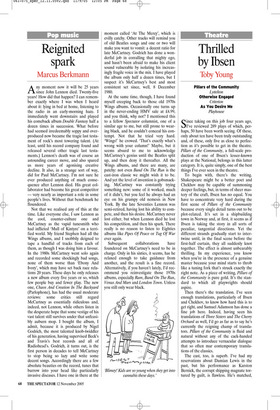Reignited spark
Marcus Berkmann
Any moment now it will be 25 years since John Lennon died. Twenty-five years! How did that happen? I can remember exactly where I was when I heard about it: lying in bed at home, listening to the radio in an early-morning haze. I immediately went downstairs and played his comeback album Double Fantasy half a dozen times in succession. What before had seemed irredeemably soppy and overproduced now became the tragic last testament of rock’s most towering talent. (At least, until his record company found and released several other tragic last testaments.) Lennon’s death was of course an astounding career move, and also spared us more years of agonising creative decline. It also, in a strange sort of way, did for Paul McCartney. I’m not sure he ever produced anything of much consequence after Lennon died. His great collaborator had become his great competitor — very nearly as important a role in some people’s lives. Without that benchmark he floundered.
Not that we realised any of this at the time. Like everyone else, I saw Lennon as the cool, counter-culture one and McCartney as the vapid tunesmith who had inflicted ‘Mull of Kintyre’ on a terrified world. My friend Stephen had all the Wings albums, and I snobbily deigned to tape a handful of tracks from each of them, as though I was doing him a favour. In the 1980s McCartney went solo again and recorded some shockingly bad songs, none of them worse than ‘Ebony And Ivory’, which may have set back race relations 20 years. These days he only releases a new album every five years or so, which few people buy and fewer play. The new one, Chaos And Creation In The Backyard (Parlophone), has had the usual moderate reviews: some critics still regard McCartney as essentially ridiculous and, indeed, not Lennon, while others listen in the desperate hope that some vestige of his vast talent still survives under that unfeasibly auburn mop. I bought the album, I admit, because it is produced by Nigel Godrich, the most talented knob-twiddler of his generation, having supervised Beck’s and Travis’s best records and all of Radiohead’s. Godrich, it turns out, is the first person in decades to tell McCartney to stop being so lazy and write some decent songs. Accordingly there are a few absolute beauties on the record, tunes that burrow into your head like particularly invasive diseases. I have one in there at the moment called ‘At The Mercy’, which is evilly catchy. Other tracks will remind you of old Beatles songs and one or two will make you want to vomit: a decent ratio for late McCartney. Godrich has done a wonderful job in corralling that mighty ego, and hasn’t been afraid to make his client sound vulnerable by isolating his increasingly fragile voice in the mix. I have played the album only half a dozen times, but I suspect it’s McCartney’s best and most consistent set since, well, 8 December 1980.
At the same time, though, I have found myself creeping back to those old 1970s Wings albums. Occasionally one turns up in the never-ending HMV sale at £4.99, and you think, why not? I mentioned this to a fellow Spectator columnist, one of a similar age to me, but still prone to wearing black, and he couldn’t conceal his contempt. Not that he tried very hard. ‘Wings!’ he crowed. ‘That’s exactly what’s wrong with your column!’ Maybe, but it seems absurd to me to acknowledge McCartney’s genius until the Beatles split up, and then deny it thereafter. All the Wings albums, and there are many, are patchy: not even Band On The Run is the cast-iron classic we might wish it to be. And yet the level of invention is gobsmacking. McCartney was constantly trying something new: some of it worked, much of it didn’t, but you feel he always had an eye on his grumpy old nemesis in New York. By the late Seventies Lennon was semi-retired, having lost his ability to compete, and then his desire. McCartney never lost either, but when Lennon died he lost his competition, and then his spark. There really is no reason to listen to Eighties albums like Pipes Of Peace or Tug Of War ever again.
Subsequent collaborations have foundered on McCartney’s need to be in charge. Only in his sixties, it seems, has he relaxed enough to take guidance from another, and the result is a fine record. Alternatively, if you haven’t lately, I’d recommend you reinvestigate those 1970s albums, especially Ram, Band On The Run, Venus And Mars and London Town. Unless you still only wear black.



























































 Previous page
Previous page